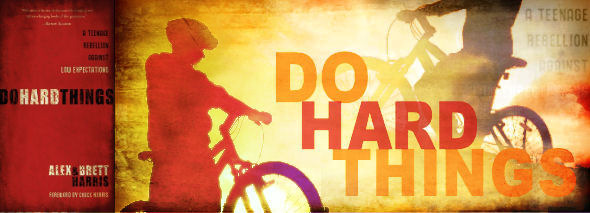
What if three words could change the face of the teenage culture forever? What if three words could challenge an entire generation to rise above the standards of an ungodly world? What if three words could obliterate the low expectations that society has for youth? What if three words could turn millions from mediocrity to a courageous pursual of their mission? Just three words.
19-year-old twins Alex and Brett Harris believe that three words -- "do hard things" -- can do all that and more. At first glance, you may think that the phrase is too simple to accomplish anything, but consider this: those words have inspired the Harris twins to start a blog with over 15 million hits, publish a novel that quickly became an Amazon bestseller, and travel all over the world giving conferences to auditoriums and churches packed with thousands of teens and adults. Surprised? Maybe you'd like to give Do Hard Things a second look! The Beginning: Some Books and a Blog It all started two years ago, when summer vacation rolled around, and the homeschooled brothers found themselves bored and listless without lessons to keep them busy. Trust dad to remedy that! Alex and Brett's father, a pastor, quickly intervened by putting the brothers on a "summer reading program" that came in the form of a thick stack of books on philosophy, sociology, history, economics, and just about everything in between. Although grueling, the reading list opened Alex and Brett to a sea of intriguing ideas, concerning problems, and pressing issues surrounding their world. "Aren't teens the ones who will grow up to live in the world those books describe?" they asked themselves. "And aren't teens the ones who will be called on to lead it? If so, we were convinced that there had to be more to the teen years than pop culture suggests." Pop culture. If you ask people what causes teen violence, eating disorders, and substance abuse, you'll probably hear those two words sooner or later. The Harris twins, however, quickly saw that pop culture's most dangerous weapon was not nearly as extreme or obvious as many are led to believe. Its main method of attack was causing complacency: making teens believe that, "I don't need to work harder or get better at what I'm doing, because I'm good enough." Pop culture was making the teen years -- the gateway to adulthood that was supposed to prepare youth for a meaningful life -- into a time reserved for taking shortcuts and living irresponsibly. What's more, everyone -- from the media, to the well-meaning adults shaking their heads over "kids these days" -- was dragging the bar lower by expecting teenagers to live this way. And, as the Harris twins quickly realized, "once we have satisfied the minimum requirements, we tend to stop pushing ourselves." Alex and Brett knew that they could not control the expectations that others had for them, but they also knew that they didn't have to limit themselves by the standard which had been set for their generation. At 16, the twins started a blog to share their ideas with other teens. Before long, the blog, entitled "The Rebelution" (a combination of the words "rebellion" and "revolution"), began to flourish into a full-fledged online community for Christian youth complete with an active forum and an extensive library of resources. Still, few people could have possibly expected the site to grow into a global movement that has inspired hundreds of thousands of teens to stop conforming to the world and start living for God. But, then, isn't that what the Rebelution is all about? Over the past two years, Alex and Brett Harris have ignored the low expectations of this world and focused solely on the expectations that they knew God had for their ministry. In 2007, the pair to began holding conferences -- throughout the USA at first, and soon, as far away as Japan -- in which the teens strove to motivate others to rise up to the Rebelutionary call. Between their duties at home, their schoolwork, and their work abroad, the teens also took time to jointly author a book that provided real-life stories and practical ideas to help youth apply these ideas to their lives. The book, entitled Do Hard Things: A Teenage Rebellion Against Low Expectations, shot up to 5th place in Amazon's sales charts, and has garnered praise from Christian figures like Chuck Norris, BarlowGirl, and Leeland Mooring. Despite the attention they have received, the Harris teens attribute their accomplishments to the grace of God and the mindset spelled out within their book's title: their choice to Do Hard Things. Choosing the Hard Way To Alex, Brett, and thousands of teens around the world, Do Hard Things is more than a catchphrase, slogan, or witty book title. It is the mission statement that challenges them daily to fight against the low cultural expectations that surround them. It is the thought that runs through their mind as they refuse drugs, stand up for the bullied, obey their parents, dress modestly, raise money for the needy, travel the world to help the impoverished, compose songs and direct biblically-based movies, and find countless other ways to offer up their potential to God. These words are, at times, the sole encouragement available to teens in a sea of "You're too young," and "It's useless to try." The idea behind Do Hard Things is so simple that the phrase is self-explanatory, yet it can mean many things: don't try to do the least you can to get by -- don't let yourself cave in and conform to the world -- go the extra mile, instead of simply fulfilling society's meager requirements. Do Hard Things means challenging yourself and stretching your abilities further than anyone but God will know or expect you to. It means remembering that Jesus tells us, "Be perfect," not, "It's noble to try to be perfect, but it's so much easier to be average, so aim for that instead." What's more, it's an idea that is applicable to every human and every situation: Alex and Brett emphasize this by dividing the concept into "small hard things" and "big hard things." Opportunities for small hard things are easy to miss: these are the little open doors that nobody but God is encouraging you to bother passing through. If you've ever seen a new student at school sitting alone, battled with whether or not to listen to a bootlegged song on YouTube, or noticed a piece of littler on the ground, you've been faced with an opportunity to do a small hard thing. No one will know if you listen to that illegal song or not -- no one will applaud you if you pick up the piece of litter -- you might even get a few jeers or weird looks if you go talk with the new student. Small hard things make up the unglamorous, overlooked warfare of daily life: if you choose to take up the battle, no one but you and God will know. It is only through doggedly pursuing the secret victories of small hard things that teens become disciplined enough to tackle "big hard things." These are the issues of local, national, and global significance such as poverty, abortion, persecution, slavery, or homelessness. While society expects teens to avoid contributing to these problems, it rarely encourages them to take action to fix them. Not Alex and Brett. A key message that the twins stress in their book is, "Be known for what you do more than for what you don't." They write, "Is the Christian life all about avoiding 'bad stuff,' or is it about doing 'good, hard stuff' for God?" Many teens avoid immorality, but isn't that the least we can do when the Son of God set us free from slavery to sin and showed us an infinitely better way? Doing hard things is not so much about rejecting sin as it is about going the optional extra mile. Rising Generation Through the Rebelution, Alex and Brett Harris encourage teenagers to commit the ultimate act of rebellion: to do difficult things in a culture that expects them to be lazy and take shortcuts. The twins themselves are continually striving to live up to the message they promote: recently, they began studies at Patrick Henry College, writing, "God's call takes us across the country -- and to a very different life than the one we've lived the past three years. We expect to be challenged and stretched." Conference tours for 2009 are already in the works, and www.therebelution.com is as active and growing as ever. A generation is coming together to live their lives on a new level. Who will be the next to step up? What obstacles will be overcome along the way? How high can a bunch of teenagers climb? Perhaps three more words can answer that one: "Expect the unexpected!" Article by Oksana K. [Editor]
Article by Oksana K. [Editor]
Image credits: Do Hard Things cover; Mario Alberto Magallanes Trejo; and others.
Some Topics for Discussion: (Feel free to discuss other things related to this article!)
1) Have you ever had anyone "look down on you because of your youth"? Tell us about your experience.
2) When a teacher, parent, or employer expects a lot from you, do you find that you work better than when their expectations are low?
3) How much of your reputation and Christian witness depends on what you don't do rather than what you do?
Leave a comment with your thoughts...















1 comments
Great article Oksana!
1) I would say SADLY no. Almost all of my life (up until 15 :P), I was under the myth of adolescence. Do Hard Things is one of the things that brought me out of that mindset. Still, I think not many youth are ‘looked down on because of their youth’ because more and more adults are taking in the myth that young people should lean back and relax for a few years. This is a sad mindset, and I think that older people should challenge the emerging generation to Do Hard Things.
2) I personally work better when I know people are expecting a lot from me. When not much is expected, I tend to have trouble getting even that done. I know sometimes it’s a hassle for higher expectations, but it’s far more worth it then.
3) This is huge. Simply saying “The teen years are a time to relax, so I’m not going to stretch myself in ____ area” is a HUGE mistake that many have admitted. Sadly, I fear even more teenagers will be saying this in years to come, that they didn’t act to stretch themselves when they were younger, so now as an adult they feel like they could have done so much better. I don’t want any teen to feel that way.
Thanks again for the article!
Camden
Post a Comment